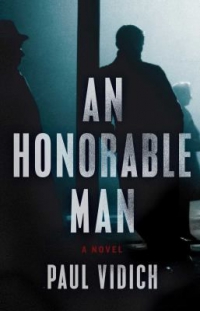
Published by Atria/Emily Bestler Books on April 12, 2016
An Honorable Man is set in 1953, against a backdrop of the Cold War and the McCarthy hearings. One of the characters is loosely based on James Speyer Kronthal, a CIA agent who was blackmailed by the NKVD. He submitted to the blackmail, and thus became a traitor, rather than risking the exposure of his homosexuality. Kronthal committed suicide before he had to answer McCarthy’s questions, which would have focused on his sexual history rather than his (still unknown) betrayal of the CIA.
In the novel, George Mueller works for the CIA. He is disgruntled and everyone knows it, so he is perfect bait. The agency dangles him before Vasilenko, a Russian agent who wants to recruit him. Mueller, of course, is playing the same game, hoping to get information from Vasilenko about a Soviet mole in the CIA known as Protocol.
When a Russian embassy driver runs him off the road as he’s bicycling, Mueller doesn’t know if he was the victim of an accident or an attempted homicide. However, the accident gives him a chance to meet Beth, who picks him up and tends his wounds. Beth is Roger Altman’s sister. Their father, a former IMF secretary, is caught up in the communist witch-hunt. Roger Altman recruited Mueller to the CIA. Small world, isn’t it?
That set-up introduces a plot that is a staple of spy fiction. The reader (like the main character) is challenged to find the mole. But that really isn’t a challenge since the book must conform, at least in a general sense, to history. The story therefore moves toward a destination that the reader can easily foresee.
The characters lack complexity, which makes me chuckle as I take note of the blurbs that compare Paul Vidich to John Le Carré. Still, a novel shouldn’t be judged by how well it lives up to its blurbs, nor should a fledgling novelist be compared to a master. Taken on its own merit, An Honorable Man manages to generate a reasonable amount of dramatic tension.
The novel is relatively short, sacrificing an intricacy of plot for bare-bones storytelling. Paul Vidich’s depiction of the Cold War atmosphere is a key to the novel’s success. Vidich’s prose is above-average and is peppered with literary references. Given the limits imposed by the novel’s length, Vidich also does a better than average job of exploring the implications of espionage, the tendency to treat it as a game without considering the morality of using human game pieces that die (or worse) when they are sacrificed or captured. There is a reasonable amount of meat in this slender novel. It works better as a novel of psychological suspense than as a spy novel, but however a reader might classify it, the novel contributes something to the espionage genre, if only as a window that allows the reader to glimpse a true story.
RECOMMENDED